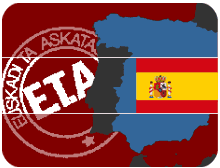1ST LEAD: Spaniards vote in two regional polls - ETA suspect held
 Vitoria/Santiago de Compostela, Spain - Spanish police detained a suspected member of the militant Basque separatist group ETA shortly before voting started Sunday in regional elections in the Basque region and nearby Galicia.
Vitoria/Santiago de Compostela, Spain - Spanish police detained a suspected member of the militant Basque separatist group ETA shortly before voting started Sunday in regional elections in the Basque region and nearby Galicia.
Officials said the 24-year-old may have been preparing an imminent attack.
Materials for making explosives were seized from the man, who was held overnight in the Basque locality of Billabona.
He was also suspected of preparing booby traps which failed to cause injuries to police officers who came to inspect them in January.
ETA has staged two bigger bombings prior to the Basque elections - in which it has urged its supporters to vote blank - without causing injuries.
Voting meanwhile began at 9 am CET in the two suspense-filled polls which were to take the political pulse of a country sinking into a deepening recession.
Voters were electing 75-member regional parliaments for the Basque region, which has 2.1 million residents, and Galicia, with 2.8 million.
In the Basque region, a party defending Spain's unity against separatist strivings was deemed to have chances to govern for the first time since the region was granted a wide measure of autonomy in 1979.
Spanish Prime Minister Jose Luis Rodriguez Zapatero's socialists were running neck-to-neck with the Basque Nationalist Party (PNV), which has currents favourable to a status close to independence.
In Galicia, the opposition conservatives were hoping to reconquer power in an attempt to improve their image after being hit by a corruption and a spying scandal.
The Basque elections were the first ones without the participation of parties close to ETA, which has killed more than 820 people over four decades.
The Supreme Court barred two formations close to ETA's views from contesting the elections, following a string of other bans since ETA's political wing Batasuna was outlawed in 2003.
Basque regional Prime Minister Juan Jose Ibarretxe's PNV focused its electoral campaign partly on warning the Basques that a socialist victory would lead to Basque affairs being managed from Madrid.
Basque socialist candidate Patxi Lopez, on the other hand, claimed to be able to unite the Basques, who are divided over independence.
Lopez was booed by separatists displaying placards favourable to independence as he came to vote in Bilbao.
Several socialist-led coalitions were deemed possible in the Basque region, where the party increased its popularity after Zapatero tried to negotiate with ETA. The six-month attempt collapsed in December 2006.
In Galicia, the issue of regional self-determination played a lesser role in a campaign characterized by attempts by the conservative People's Party (PP) to reconquer power which it lost to a coalition of socialists and Galician nationalists in 2005.
Analysts said socialist chances could be undermined by Spain's deepening recession, with unemployment expected to climb to up to 19 per cent by 2010.
A victory in Galicia would help the PP at a time when its reputation is being questioned over several scandals.
Prominent judge Baltasar Garzon is investigating about 40 people over allegations that PP-governed municipalities granted contracts worth tens of millions of euros and illegal building permits in exchange for bribes.
The Madrid regional parliament is also investigating allegations that the PP-led regional government spied on rivals within the party.
The Galician elections aroused considerable interest in Latin America, which has numerous residents of Galician origin.
Eligible voters included 335,000 Galicians living outside Spain. The countries with most Galicians include Argentina, Venezuela, Brazil, Uruguay, Mexico and Cuba. dpa